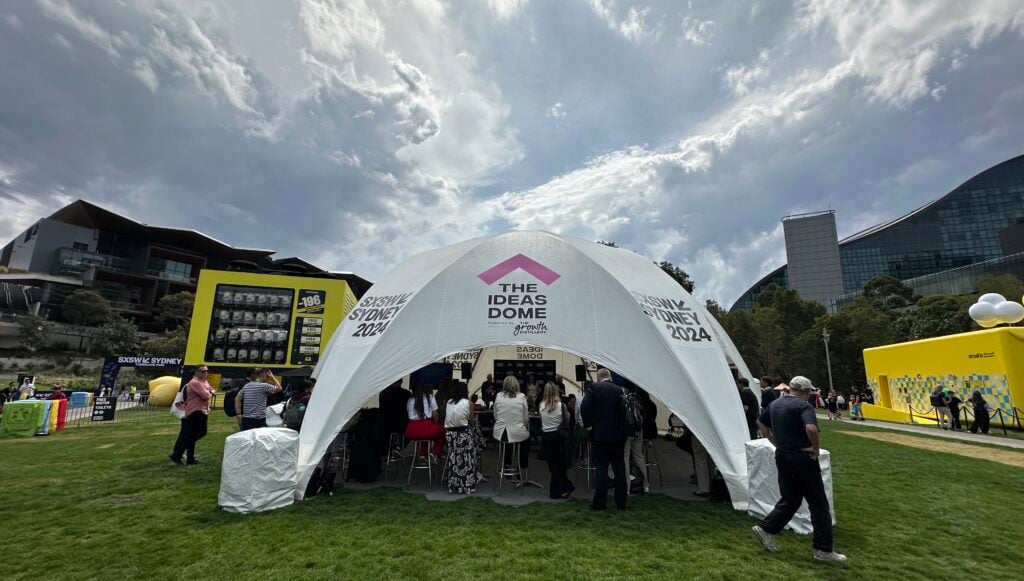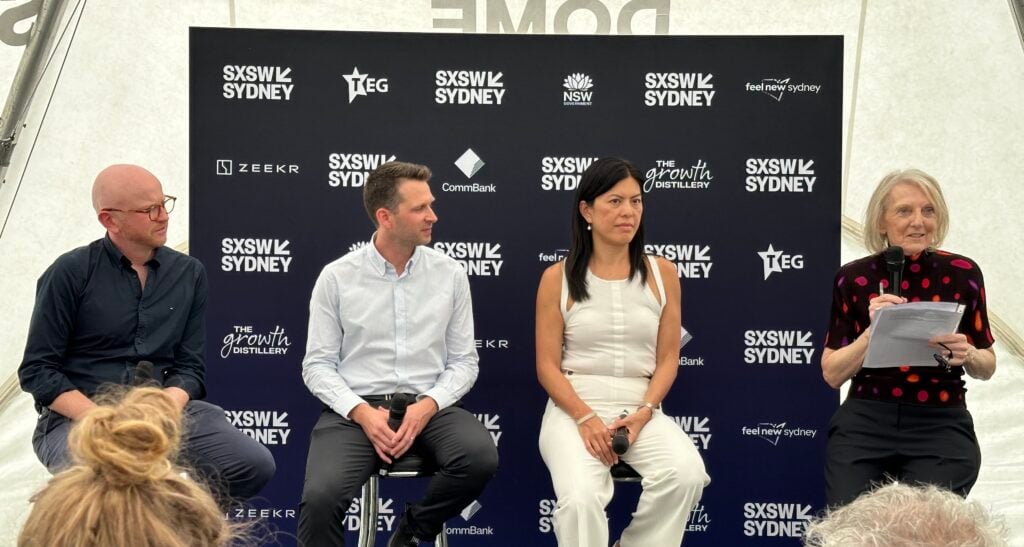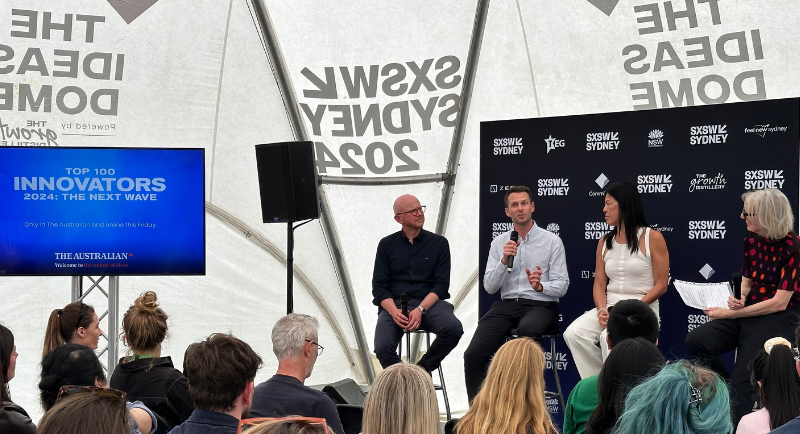The Ideas Dome, powered by The Growth Distillery, is centrally located in Tumbalong Park and offers free sessions all week curated by SXSW Sydney.
The first session inside News’s Corp’s The Ideas Dome at SXSW was presented by The Australian. The topic was Innovators: The Next Wave.
The session coincides with a significant publishing event at the national daily this week. On Saturday, The Weekend Australian will announce the Top 100 Innovators of 2024 in a weekend magazine insert
Chairing the discussion about innovators was Helen Trinca, The List: Innovators editor at The Australian.
Her guests on the panel were Jared Lynch, Tech Editor, The Australian, Ada Guan, CEO Rich Data Company, and Michael Batko, CEO, Startmate.
As our photo indicates, storm clouds gathered above Tumbalong Park during the session. Towards the end of the allotted time, event organisers shut it down as the Park was evacuated after several loud claps of thunder.

Innovators: The Next Wave talking points
Does starting a company offer more job security through rich experiences and employability compared to traditional corporate jobs?
• Entrepreneurship could be considered a viable career path, shifting cultural views away from narrow job options.
• Key traits needed for successful entrepreneurs.
• Resilience as a factor: Embracing challenges and failure are keys to growing stronger.
• Founders should remain focused on solving core problems rather than only developing solutions.
• Importance of diverse gender representation in funding and entrepreneurship.
• AI’s rapid advancement mirrors past technological shifts, with practical applications highlighted.
• AI aids in faster, more efficient product development and customer engagement.
• Financial services, health, and hardware are key areas for AI-driven innovation.
Next Wave in The Ideas Dome highlights
Helen Trinca started the session: “So many people think that the safe path is just to go and work at a big corporate. I’m not going to call out any names right now, but you can think about banks, consulting companies, etc. Because you’ve got so much optionality. You’re going to work with 15 different companies and it’s going to open up so many different doors.
“But then those companies let go five or 10% of the workforce every couple of years and they go for a huge redundancy or thousands and thousands of people.
“Actually, job security is when you start a company because you have the entire spectrum of experience and you’re so much more employable, so many more richer experiences off the back of it.”
Ada Guan: “One thing I would say is don’t leave any regret in life, right? So if you have a passion to do something, do it and don’t wait. I’m a different person sitting here today versus nine years ago when we started RDC. I learned a ton in the process. I think RDC being successful, great. And if not, I’m still learning a ton as a person and I am growing a lot as a person. It’s a very rewarding journey and being on an entrepreneurial journey and you build some very strong partnership, very strong friendship, which will last a lifetime. It’s something people should try, but perhaps not too driven by money and more driven by the learning and the growth. Because if you have the good product, good customer, I think money will come.”

A question from the audience then asked about the three most common traits an entrepreneur needs.
Jared Lynch: “I think tenacity. I mean, you’ve got to be, to a certain point, you’ve got to be as hard as nails and really back your ideas and not be scared of failure. If you do fail, make sure you do it quickly and bounce back again. That’s a really hard thing to do. On the flip side, you don’t want to be jaded. You also want to be full of boundless optimism, right?
“Because if you’re not, then people pick up on that. And at the end of the day, you’re selling something. You’re selling your ideas. If you’re a bit jaded and a bit downtrodden, then people are going, nah, I don’t want to have anything to do with you.”
Michael Batko: “The first one is definitely resilience. And because you also mentioned it, failure is hard. It is so incredibly hard. It’s painful. But then again, we all go to the gym. What do we do in the gym? We injure our muscles. We injure our muscles to get stronger. It’s kind of like through that failure, through that, like actually leaning into the hard things, you actually become better.
“The best founders are the ones who are not afraid of the hard truths. They actually lean into it, and they expose themselves to the daily pain of talking to customers and getting rejected every single day. It is so frustrating, but it is so magical when one customer comes on board. The second thing would be a founder problem fit.”
See also: SXSW Sydney 2024 day one recap – Thunder rocks houses as year two conference & festival launches
